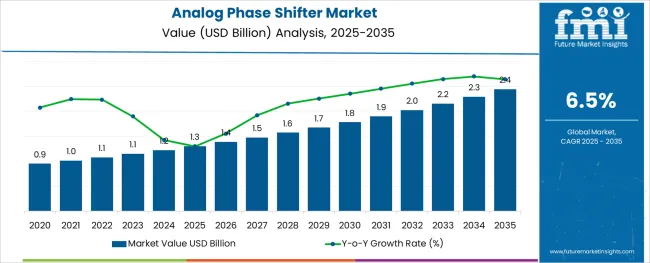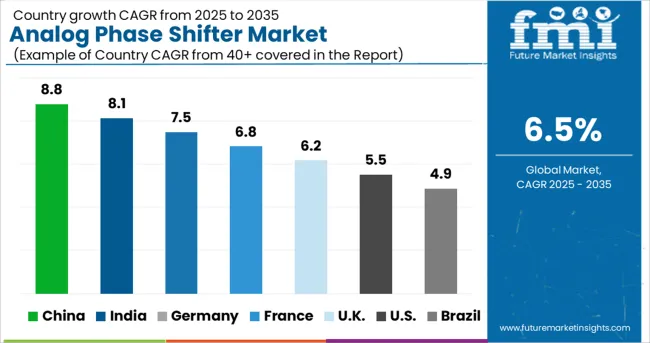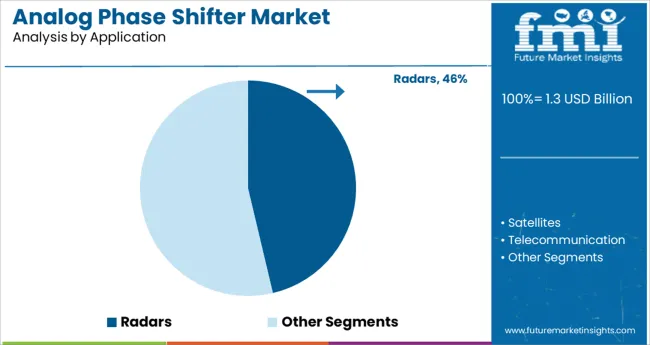The Analog Phase Shifter Market is estimated to be valued at USD 1.3 billion in 2025 and is projected to reach USD 2.4 billion by 2035, registering a compound annual growth rate (CAGR) of 6.5% over the forecast period.

The analog phase shifter market is experiencing steady growth driven by expanding applications in advanced radar systems. Industry insights highlight the increasing demand for precise signal phase control to enhance radar accuracy and reliability in both defense and civilian sectors. The rise of sophisticated radar technologies in aerospace, military surveillance, and weather monitoring has fueled the need for phase shifters capable of delivering low-loss, high-speed phase adjustment.
Technological advancements in semiconductor materials and circuit design have improved the performance and miniaturization of analog phase shifters. Additionally, global investments in defense modernization programs and air traffic control infrastructure upgrades support the expanding market.
Future opportunities are expected as radar applications evolve with emerging trends in autonomous vehicles and space exploration. Segment growth is projected to be led by radar applications due to their critical requirement for precise phase control to achieve target detection and tracking.

The market is segmented by Application and region. By Application, the market is divided into Radars, Satellites, and Telecommunication. Regionally, the market is classified into North America, Latin America, Western Europe, Eastern Europe, Balkan & Baltic Countries, Russia & Belarus, Central Asia, East Asia, South Asia & Pacific, and the Middle East & Africa.

The Radars segment is projected to hold 46.3% of the analog phase shifter market revenue in 2025, solidifying its position as the primary application. The segment’s growth is driven by the increasing deployment of phased array radar systems, which rely on analog phase shifters for beam steering and signal processing.
Radar technology advancements demand phase shifters that provide rapid, accurate phase adjustments with minimal signal degradation. The expanding use of radars in defense, aerospace, and weather forecasting has made this segment a cornerstone for analog phase shifter demand.
Furthermore, the integration of analog phase shifters into multifunction radar systems supports enhanced situational awareness and operational efficiency. As radar technologies continue to evolve and diversify, the Radars application segment is expected to maintain its dominant role in market revenue.
| Market Statistics | Details |
|---|---|
| H1,2024 (A) | 27.9% |
| H1,2025 Projected (P) | 40.7% |
| H1,2025 Outlook (O) | 29.0% |
| BPS Change : H1,2025 (O) - H1,2025 (P) | (-) 1170 ↓ |
| BPS Change : H1,2025 (O) - H1,2024 (A) | (+) 110 ↑ |
Future Market Insights forecasts a comparison and review analysis of the dynamics of the analog phase shifter market. A few of the key elements propelling the expansion of the analog phase shifter market are innovations in antenna technology for practical applications and the development of 4G and 5G radio technologies.
The difference in the BPS values observed in the analog phase shifter market in H1, 2025 - outlook over H1, 2025 projected implies an 1170-unit reduction, according to the FMI analysis.
The impacting factor which restrain the growth of the market is that the cost associated with analog phase shifters are comparatively high in comparison for products with similar offerings and adoption of digital phase shifters for a more uniform performance with noise immunity on control lines. This prevents the industry from expanding and restraints its growth.
Furthermore, compared to H1-2024, the market is anticipated to grow by 110 points in H1-2025. The market for analog phase shifters experienced significant expansion due to the pervasiveness and ubiquity of telecommunication infrastructure. Analog phase shifters will also see favorable demand in the upcoming years due to the increased emphasis on aerial defense.
As political instability and civil war continues in the Middle East, rich economies like the USA and Saudi Arabia are likely to spend heavily on their aerial defence programs. Procurement of air-to-surface missiles and up-gradation of military jets is also on the rise.
Many countries are even implementing usage of drones into their arsenal. As phased array antennas are largely used in missile defence systems and military jets, the increasing focus on aerial defence will result in a favourable demand for analog phase shifters in the coming years.
Phased array radars have become omnipresent to defence applications due to significant investments over a long period of time. Several technological advancements in this sector have garnered the interest of a number of industries.
The application of phased array technology is done in many technologies such as air traffic control, weather monitoring, and automotive radar. Other than this, the usage of phased array antennas is also rampant in passenger airlines and private space explorers to develop applications on top of the currently available products.
The current technologies have undergone a significant overhaul on their design and efficiency and thus, manufacturers have leveraged their technology skills gained from defence expertise into the development of commercial solutions.
Traditionally, phased array radars have been costly, inflexible, and complex to calibrate. This was acceptable in the case of defence applications because the defence industry is generally characterised with longer product development cycles and costlier products.
However, airlines have put forward cost concerns as one of the primary reservations against the adoption of phased array radars. To meet the cost requirements, manufacturers have developed methods to mass produce analog phase shifters and phased array antennas by not using dielectric or meta-materials.
What remains to be seen is the actual implementation of cost optimised radars and other analog phase shifter applications in the aviation sector and the subsequent benefits vis-à-vis the price points offered by manufacturers.
The global analog phase shifter market is estimated to be valued at USD 1.3 billion in 2025.
It is projected to reach USD 2.4 billion by 2035.
The market is expected to grow at a 6.5% CAGR between 2025 and 2035.
The key product types are radars, satellites and telecommunication.
segment is expected to dominate with a 0.0% industry share in 2025.






Full Research Suite comprises of:
Market outlook & trends analysis
Interviews & case studies
Strategic recommendations
Vendor profiles & capabilities analysis
5-year forecasts
8 regions and 60+ country-level data splits
Market segment data splits
12 months of continuous data updates
DELIVERED AS:
PDF EXCEL ONLINE
Analog to Digital Converter Market Size and Share Forecast Outlook 2025 to 2035
Analog & Digital IC Development Tools Market Size and Share Forecast Outlook 2025 to 2035
Cheese Analogue Market Insights - Growth & Demand Analysis 2025 to 2035
Precision Analog Potentiometer Market Size and Share Forecast Outlook 2025 to 2035
Metal Film Analog Potentiometers Market Size and Share Forecast Outlook 2025 to 2035
Special-Purpose Analog-to-Digital Converters (ADCs) Market Forecast and Outlook 2025 to 2035
Phase Shifting Transformer Market Size and Share Forecast Outlook 2025 to 2035
Dual-Phase Cleanser Market Size and Share Forecast Outlook 2025 to 2035
Solid Phase Carrier Resin for Peptide Drug Synthesis Market Size and Share Forecast Outlook 2025 to 2035
Early Phase Clinical Trial Outsourcing Market Size and Share Forecast Outlook 2025 to 2035
Three Phase Commercial Voltage Regulator Market Size and Share Forecast Outlook 2025 to 2035
Three Phase String Inverter Market Size and Share Forecast Outlook 2025 to 2035
Three Phase Inverter Market Size and Share Forecast Outlook 2025 to 2035
Three Phase Residential Voltage Regulator Market Size and Share Forecast Outlook 2025 to 2035
Three Phase Recloser Market Size and Share Forecast Outlook 2025 to 2035
Three Phase Green Power Transformer Market Size and Share Forecast Outlook 2025 to 2035
Three Phase Micro Inverter Market Size and Share Forecast Outlook 2025 to 2035
Three Phase Residential Power Conditioner Market Size and Share Forecast Outlook 2025 to 2035
Three Phase Shunt Reactor Market Size and Share Forecast Outlook 2025 to 2035
Three Phase Power Device Analyzer Market Size and Share Forecast Outlook 2025 to 2035

Thank you!
You will receive an email from our Business Development Manager. Please be sure to check your SPAM/JUNK folder too.
Chat With
MaRIA